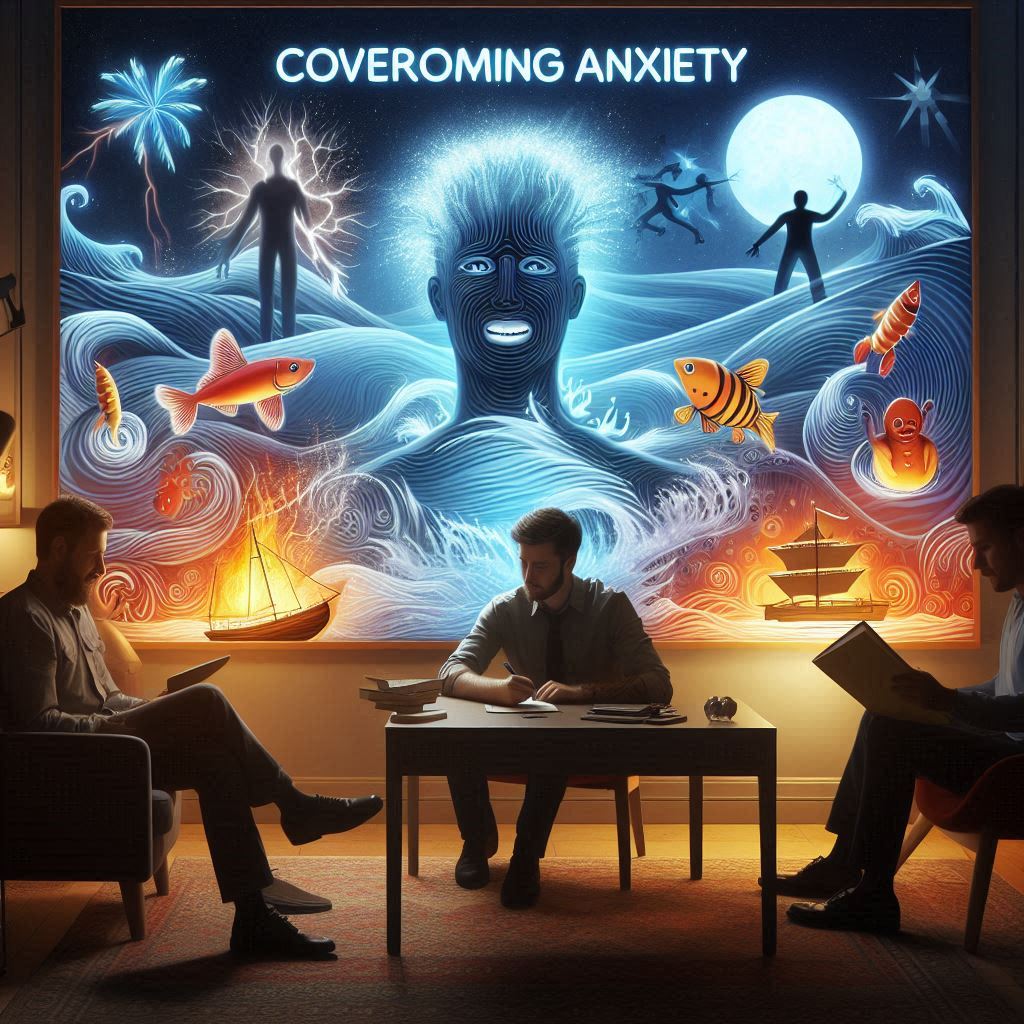Overcoming Anxiety: Effective Strategies and Therapies
Understanding Anxiety
Anxiety is a common mental health condition characterized by feelings of worry, nervousness, or fear that can be mild or severe. It can interfere with daily activities, making it difficult to cope with everyday situations. According to the National Institute of Mental Health, anxiety disorders affect nearly 20% of the adult population in the United States each year.
Common Symptoms of Anxiety
- Excessive worrying
- Restlessness
- Fatigue
- Difficulty concentrating
- Irritability
- Muscle tension
- Sleep disturbances
Effective Strategies for Managing Anxiety
Managing anxiety involves a combination of strategies that include lifestyle changes, coping mechanisms, and professional therapies. Here are some effective strategies to consider:
1. Lifestyle Changes
Making certain lifestyle changes can significantly impact anxiety levels:
| Strategy | Description |
|---|---|
| Regular Exercise | Engaging in physical activity helps reduce stress and improves mood. Aim for at least 30 minutes of exercise most days of the week. |
| Healthy Diet | Eating a balanced diet rich in fruits, vegetables, lean proteins, and whole grains can help regulate mood and energy levels. |
| Adequate Sleep | Getting enough sleep is crucial for mental health. Aim for 7-9 hours of sleep per night. |
| Limiting Caffeine and Alcohol | Reducing intake of caffeine and alcohol can help minimize anxiety symptoms. |
2. Coping Mechanisms
Implementing coping mechanisms can help manage anxiety in the moment:
| Mechanism | Description |
|---|---|
| Deep Breathing | Practicing deep breathing exercises can help calm the nervous system and reduce anxiety. |
| Mindfulness Meditation | Engaging in mindfulness meditation can help ground thoughts and reduce stress. |
| Journaling | Writing down thoughts and feelings can help process emotions and reduce anxiety. |
| Progressive Muscle Relaxation | This technique involves tensing and then relaxing different muscle groups to reduce physical tension. |
3. Professional Therapies
Seeking professional help can provide more structured and effective treatments:
| Therapy | Description |
|---|---|
| Cognitive Behavioral Therapy (CBT) | CBT is a type of psychotherapy that helps individuals identify and change negative thought patterns and behaviors. |
| Exposure Therapy | This therapy involves gradually exposing individuals to their fears in a controlled environment to reduce anxiety. |
| Medication | In some cases, medication such as antidepressants or anti-anxiety drugs may be prescribed by a healthcare professional. |
| Group Therapy | Participating in group therapy can provide support and encouragement from others who are experiencing similar challenges. |
Success Stories and Exemplary Cases
There are numerous success stories of individuals who have effectively managed their anxiety through various strategies and therapies. These cases highlight the importance of finding the right combination of treatments:
- Verywell Mind shares stories of people who have overcome anxiety through therapy and lifestyle changes.
- The Anxiety and Depression Association of America provides personal stories of individuals who have found relief from anxiety through various treatment methods.
Conclusion
Overcoming anxiety is a journey that requires patience, persistence, and a willingness to explore different strategies and therapies. Whether through lifestyle changes, coping mechanisms, or professional help, it is possible to manage anxiety and lead a fulfilling life. If you or someone you know is struggling with anxiety, reach out to a healthcare professional for guidance and support.

Pros and Cons of Overcoming Anxiety: Effective Strategies and Therapies
Understanding Anxiety
Anxiety is a common mental health condition characterized by feelings of worry, nervousness, or fear that can be mild or severe. It can interfere with daily activities, making it difficult to cope with everyday situations. According to the National Institute of Mental Health, anxiety disorders affect nearly 20% of the adult population in the United States each year.
Common Symptoms of Anxiety
- Excessive worrying
- Restlessness
- Fatigue
- Difficulty concentrating
- Irritability
- Muscle tension
- Sleep disturbances
Pros and Cons of Effective Strategies for Managing Anxiety
1. Lifestyle Changes
| Pros | Cons |
|---|---|
|
|
2. Coping Mechanisms
| Pros | Cons |
|---|---|
|
|
3. Professional Therapies
| Pros | Cons |
|---|---|
|
|
FAQs on Overcoming Anxiety: Effective Strategies and Therapies
Conclusion
If you have more questions about anxiety and its treatments, it is important to seek guidance from a healthcare professional. They can provide personalized advice and recommend the best strategies and therapies for managing anxiety effectively. Remember, overcoming anxiety is a journey, and with the right support, it is possible to lead a fulfilling life.
Disclaimer and Caution: Overcoming Anxiety
The information provided on this website, including articles, FAQs, and other content, is intended for educational and informational purposes only. It is not a substitute for professional medical advice, diagnosis, or treatment. Always seek the advice of your physician or other qualified health provider with any questions you may have regarding a medical condition.
Medical Disclaimer
The content on this website is not intended to be a substitute for professional medical advice, diagnosis, or treatment. The information provided here is for general informational purposes only and is not intended to diagnose, treat, cure, or prevent any disease or condition. If you have or suspect you may have a medical problem, promptly contact your professional healthcare provider.
Accuracy of Information
While we strive to provide accurate and up-to-date information, we make no warranties or representations regarding the accuracy, completeness, reliability, or timeliness of any information on this website. Medical information is constantly evolving, and new research may change the context or understanding of various topics discussed here. Therefore, the information provided may not reflect the most current medical knowledge or practices.
Not a Substitute for Professional Advice
The content on this website should not be used as a substitute for professional medical advice, diagnosis, or treatment. Never disregard professional medical advice or delay in seeking it because of something you have read on this website. If you have any questions or concerns about your health, always seek the guidance of a qualified healthcare provider.
Individual Results May Vary
The effectiveness of various anxiety management strategies and therapies can vary greatly among individuals. What works for one person may not work for another. It is important to consult with a healthcare provider to develop a personalized plan that meets your specific needs. Success stories and exemplary cases shared on this website are for illustrative purposes only and may not represent typical results.
Cautionary Notes
When considering any new treatment or therapy for anxiety, it is important to approach with caution. Here are some key considerations to keep in mind:
Consult with a Healthcare Professional
Before starting any new treatment or therapy for anxiety, it is crucial to consult with a healthcare professional. They can provide personalized advice based on your medical history and current health condition. This includes consulting with a doctor before starting any new medication, supplement, or therapy.
Potential Side Effects
All treatments and therapies can have potential side effects. Medications, in particular, can have varying effects on different individuals. Be aware of the possible side effects of any treatment you are considering and discuss these with your healthcare provider. They can help you weigh the benefits and risks to make an informed decision.
Therapy Commitment
Therapies such as Cognitive Behavioral Therapy (CBT) and exposure therapy require a significant commitment of time and effort. It is important to be prepared for the emotional and physical demands of these therapies. Discuss the commitment required with your therapist to ensure you are ready to undertake the process.
Alternative and Complementary Therapies
Many people explore alternative and complementary therapies such as herbal supplements, acupuncture, or yoga for anxiety management. While some individuals may find relief from these methods, it is important to approach them with caution. Not all alternative therapies are supported by scientific evidence, and some may interact with other treatments or medications. Always consult with a healthcare provider before starting any alternative therapy.
Beware of Misinformation
With the abundance of information available online, it can be challenging to discern credible sources from misinformation. Rely on reputable sources for information about anxiety and its treatment, such as the National Institute of Mental Health and the Anxiety and Depression Association of America. Be cautious of anecdotal advice or unverified claims.
Mental Health Stigma
Mental health conditions, including anxiety, can carry a stigma that may prevent individuals from seeking help. It is important to recognize that anxiety is a common and treatable condition. Do not let stigma or fear of judgment prevent you from seeking the help you need. Reach out to trusted friends, family, or healthcare providers for support.
Conclusion
Managing anxiety effectively requires a comprehensive approach that includes professional guidance, informed decision-making, and a willingness to explore various treatment options. Always prioritize your safety and well-being by consulting with healthcare professionals and relying on credible sources of information. Remember, overcoming anxiety is a journey, and with the right support and strategies, it is possible to lead a fulfilling life.
